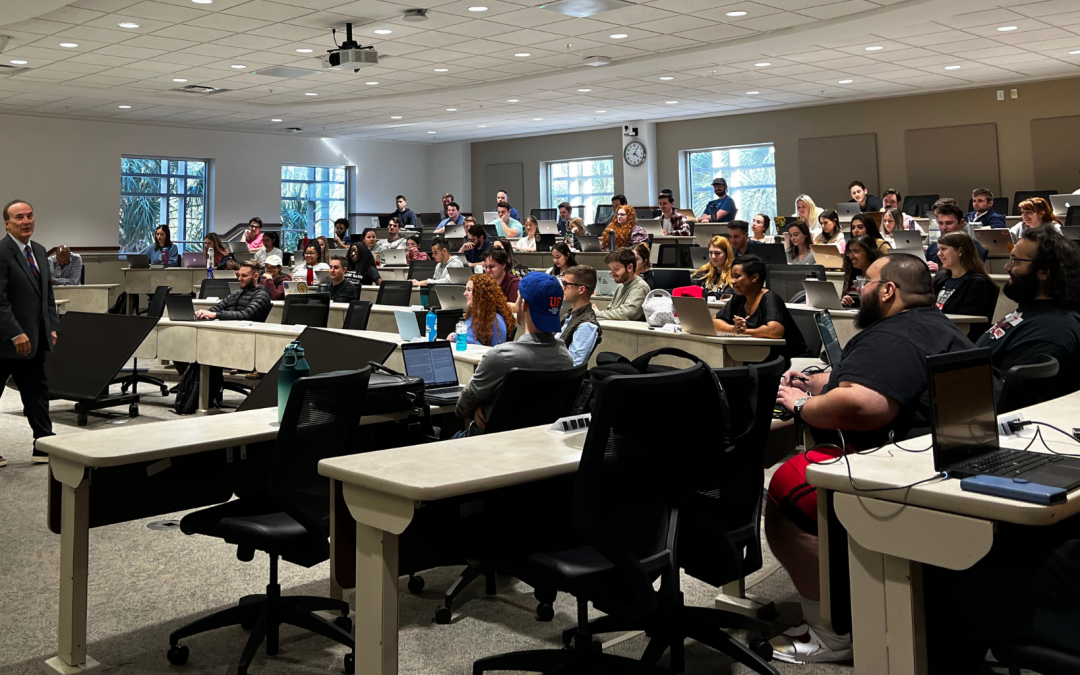The digital age has ushered in an era where the mastery of electronic data identification, collection, and analysis is paramount for legal professionals. Recognizing the critical importance of this skill, the University of Florida Levin College of Law has been pioneering education in electronic discovery (eDiscovery). This program equips law and paralegal students with the necessary tools and knowledge to proficiently manage the vast streams of electronic data in modern legal environments.
Our collaboration with Professor William Hamilton has provided his University of Florida Levin College of Law students with licenses to use CrossCopy Enterprise. This initiative is part of a class lab project focusing on the collections in eDiscovery, allowing students to gain hands-on experience with state-of-the-art technology in a controlled educational setting. We had the opportunity to discuss with Professor Hamilton the integration of CrossCopy Enterprise into his curriculum and the broader implications for legal education.
Pinpoint Labs: Could you provide an overview of the “Electronic Discovery, Digital Investigations, and Evidence” course at the University Levin College of Law and its objectives in preparing both law students and paralegal students for the realities of eDiscovery practice?
Professor Hamilton: This course offers a comprehensive introduction to the rules, statutes, cases, and electronic discovery principles, which have become a dominant aspect of litigation. We emphasize practical litigation problems, issues, and strategies. The course is crucial for anyone anticipating a litigation career, providing a real sense of what it means to be a litigator handling electronic discovery and data analytic issues.
Pinpoint Labs: What motivated you to incorporate cloud collections, particularly CrossCopy Enterprise, into the course curriculum, and how do you integrate various eDiscovery and investigation tools to provide students with a comprehensive understanding of the field?
Professor Hamilton: Cloud collection is now a critical aspect of e-discovery. Pinpoint provided access to CrossCopy so each student could perform a collection from a remote Google location I set up, replicating an actual eDiscovery collection experience.
Pinpoint Labs: How do you integrate practical, hands-on experiences with various eDiscovery and investigation tools into the course, and how does this experiential learning approach contribute to students’ mastery of eDiscovery concepts?
Professor Hamilton: Access to tools like CrossCopy is critical. We organize mock activities with curated data that mirror real-world practices, helping students understand the nuances of eDiscovery tools and their applications.
Pinpoint Labs: Why is it important for lawyers and other legal professionals to understand eDiscovery and the technologies used in the process, and how does this understanding enhance their effectiveness in legal practice?
Professor Hamilton: Lawyers must be able to communicate with and supervise technicians effectively; understanding the technology and its foundational operations is essential. Additionally, lawyers often need to explain these processes in court, making a solid grasp of eDiscovery tools and their utility and reliability indispensable.
Pinpoint Labs: Considering the increasing relevance of cloud-based data and forensic collections in legal practice and the broader spectrum of eDiscovery and investigations tools, how do you see the incorporation of such technologies shaping the future of legal education for both law students and paralegal students?
Professor Hamilton: The trend toward cloud-based tools and online data storage has existed for some time. With the increasing shift to services like Office 365 and other online platforms, understanding cloud collections and eDiscovery tools is becoming increasingly essential. On the collection front, CrossCopy allows us to hash value check the collected data against the source. Students must understand the importance of verifying the data copying activity and collecting a log of sources, data, time, and target.
Pinpoint Labs: Finally, what advice would you offer fellow educators seeking to integrate a wide range of eDiscovery and investigation tools into their curricula to better prepare law students and future paralegals for the evolving landscape of electronic discovery and digital investigations?
Professor Hamilton: It’s vital to make students comfortable with technology. Many law students come from humanities backgrounds and are initially hesitant about e-discovery tools and technical aspects of moving and analyzing data. Providing hands-on experience with advanced tools like CrossCopy Enterprise is crucial for developing their competence and confidence.
This conversation underscores the transformative impact of integrating cutting-edge technologies like CrossCopy Enterprise into legal education. It highlights how these tools shape the future legal professionals ready to tackle the complexities of the digital age. As data grows exponentially, the ability to efficiently collect and analyze electronic information is becoming ever more critical, ensuring that our future legal professionals are well-equipped to meet these challenges head-on.

